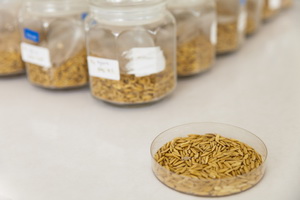
CRISPR-Cas9-mediated Editing Reveals a Major Role of a SUMO Protease in Rice Salt Tolerance
February 27, 2019| |
 A large family of genes in rice are responsible for the production of small ubiquitin-like modifiers (SUMOs), which are vital in responding to various environmental cues. In a previous study, it was demonstrated that the OsOTC class of SUMO proteases has a critical role in salt and drought stress through gene silencing or RNA interference. However, finding out the role of each family member is not possible with RNAi. Thus, Ari Sadanandom from Durham University and colleagues conducted another study using the CRISPR-Cas9 system for targeted mutagenesis of OsOTS1 in rice cultivar Kitaake.
A large family of genes in rice are responsible for the production of small ubiquitin-like modifiers (SUMOs), which are vital in responding to various environmental cues. In a previous study, it was demonstrated that the OsOTC class of SUMO proteases has a critical role in salt and drought stress through gene silencing or RNA interference. However, finding out the role of each family member is not possible with RNAi. Thus, Ari Sadanandom from Durham University and colleagues conducted another study using the CRISPR-Cas9 system for targeted mutagenesis of OsOTS1 in rice cultivar Kitaake.
Results showed that guided RNA mediated mutation in OsOTS1 was very effective with ~95% of the transgenic plants exhibiting the desired effect without off-target mutations observed. Furthermore, the mutations were heritable in the subsequent generations. OsOTS1 CRISPR lines showed improved sensitivity to salt with reduced root and shoot biomass indicating that OsOTS1 has a major role in salt stress tolerance in rice.
The results imply that precise and effective genome editing can be used to characterize the SUMO system in rice.
Read more results from BioRxiv.
| |
Biotech Updates is a weekly newsletter of ISAAA, a not-for-profit organization. It is distributed for free to over 22,000 subscribers worldwide to inform them about the key developments in biosciences, especially in biotechnology. Your support will help us in our mission to feed the world with knowledge. You can help by donating as little as $10.
-
See more articles:
-
News from Around the World
- FAO Report: Biodiversity Vital for Food and Agriculture Declining Fast
- USDA FAS Releases Report on Agri-biotech Status of South Africa
- Scientists Develop Wheat that Fights Celiac Disease
- US Ag Secretary Perdue: "Don't Fear Your Food"
- Isabela Governor: "Golden Rice is a Responsible Research"
- Independent Review Finds GM Crop Moratorium in South Australia Costing Farmers Millions
- Researchers Discover How Cell Walls are Assembled
-
Research Highlights
- Overexpression of Maize Gene Enhances Salt and Drought Tolerance in Transgenic Tobacco
- Scientists Develop Method for Regeneration and Transformation of Groundcherry
-
Announcements
- International Conference on Plant Breeding for Sustainable Development
-
Resources
- Infographics: How Crops are Genetically Modified
- 5 Questions with Dr. CD Mayee, the Farmer's Son Who Became India's Champion of Biotech
-
Plant
- CRISPR-Cas9 Used to Develop Lignin-enriched Rice
- Scientist Expounds on Process and Benefits of CRISPR-Cas9 System in SEARCA BIC Policy Brief
- CRISPR-Cas9-mediated Editing Reveals a Major Role of a SUMO Protease in Rice Salt Tolerance
-
Read the latest: - Biotech Updates (January 28, 2026)
- Gene Editing Supplement (January 28, 2026)
- Gene Drive Supplement (February 22, 2023)
-
Subscribe to BU: - Share
- Tweet
